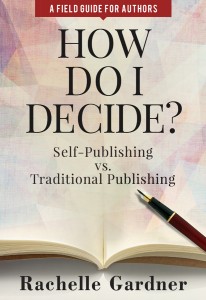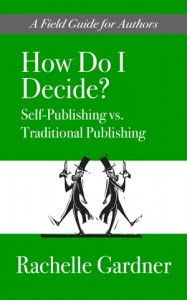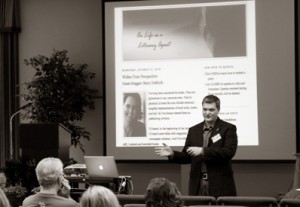 I’m blogging at Books & Such today. Here’s a preview:
I’m blogging at Books & Such today. Here’s a preview:
I’m often struck by the similarities between the competition reality shows on TV these days, and life in the publishing environment. The programs bring together hopefuls in an endeavor—baking, fashion, business, movie makeup, singing—and pit them against each other. Along the way, the competitors make friends, make enemies, learn more about their chosen endeavor, and learn about themselves.
The shows are not only fun, they’re full of insights. Here are a few things I’ve been thinking lately as I watch the new season of American Idol.
1. Some people are more talented than they know. Others are less talented than they think they are.
Some contestants come in with beautiful voices that are unpolished; some have hopeless voices but they’re trying really hard. Some have so much enthusiasm you can’t help but like them, and some are so dull that they could have the most accomplished voice in the world but no one would want to hear it. Some have a sense of entitlement (How could you NOT pick ME?) and others are beautifully humble, surprised that the judges would give them a smile and a kind word. In singing, as in writing, it’s difficult to know how good you are without outside, objective input. And the first time you receive it can be a shock—in either a positive or negative way.
2. The judges know more than you realize.
It’s surprising how much the judges can tell from such a small amount of information. You think—how could they possibly make a decision so quickly? They stop the singer after 16 bars; they take one small taste of the cake; barely a glance at the elaborate costume design—and pronounce their verdict. It’s just like when an experienced agent or editor forms an opinion about a written piece from the first page. You wonder how they can possibly have enough information to reach a conclusion, and it can feel a little harsh. But those who have spent years working in a field—learning, studying, honing their instincts—can quickly form an opinion that wouldn’t change even with much more information.
The post 7 Ways the Writer’s Life is Like American Idol appeared first on Rachelle Gardner.
 I spend a lot of time working with my clients to edit and revise their proposals and manuscripts. I give notes and suggestions for improvements. Sometimes I take them through draft after draft, until everything seems just right.
I spend a lot of time working with my clients to edit and revise their proposals and manuscripts. I give notes and suggestions for improvements. Sometimes I take them through draft after draft, until everything seems just right.
I know it’s tiring for them, and sometimes frustrating to be pushed to go over it again and again, especially when they know they’ll go through more edits with their publisher. I admire every writer who does whatever is necessary, who keeps pushing through, who remains dedicated to making the work the best it can be.
This is what it takes to be good. When an editor pushes you to be your best, or when you push yourself, you’re doing exactly what’s necessary to rise above the hordes of regular writers to become a good writer. Along those lines, I read this powerful piece in the book Telling True Stories: A Nonfiction Writers’ Guide from the Nieman Foundation at Harvard University.*
No one, not even the greatest writers, creates good first drafts. “I have to write crap before I can write anything that is not crap,” says Walt Harrington, who has been writing well for thirty years. “Writing is thinking. It is an extension of the reporting process.” A first draft might have promising sentences or paragraphs, a brilliant conceptualization, a few surprising turns of phrase, or a sturdy framework. All that, however, will probably be barely visible, entangled in the general messiness of half-formed ideas. Those promising elements will reveal themselves as the writer begins to tease apart the mess with the next draft and the one after that.
Still, as you read through a flawed first draft, remember that the hardest work is behind you. You have moved closer to defining the topic and developed strategies for explaining it…. You have stared down the blank page and begun building something on it.
Good writing is far too complex to get right in one draft or two or five. Good writers are most often plain ol’ writers who go the extra mile and then a few more.
If you are struggling through draft after draft, trying to get it right, take heart. You’re going the extra mile, and then a few more. Keep putting in the work, and you will become a good writer.
Are you pushing yourself hard enough? Are you going through enough drafts to push yourself to be a good writer?
Tweet this: “Good writers go the extra mile.” Some encouragement from @RachelleGardner.
*Quote from Telling True Stories, p. 97, by Mark Kramer & Wendy Call.
Image credit: stocksnapper / 123RF Stock Photo
The post Nobody Writes Good First Drafts appeared first on Rachelle Gardner.
 I’m blogging at Books & Such today. Here’s a preview:
I’m blogging at Books & Such today. Here’s a preview:
Last week I wrote about two ways your work can be used without your permission: plagiarism and piracy. But questions have come up about another kind of problem that worries writers:
What if someone steals your idea, and writes a book on the same topic as you?
Angela Mills wrote:
I’m finishing up my first novel and I feel it’s a pretty timely, unique idea. I have scoured Christian fiction bookstores and catalogs and haven’t found any book with this kind of plot/setting. Should I keep the idea to myself until I find an agent and get it sold? I’m one of those people that doesn’t like to talk about what I’m writing anyway, but I’m trying to figure out how to answer when other writers ask what my book is about.
The best way to deal with this particular situation is simply to be vague when discussing your book. Don’t give details about your plot or subject matter. “It’s a romance set against the backdrop of a modern day reality show,” or “It’s a story about life in Auschwitz during World War II.”
The bigger question on many writers’ minds seems to be, what if other authors are writing books on the same idea as mine?
My philosophy has always been that you can give 100 writers the same book idea, and you’d end up with 100 different books. While there are some really great ideas out there, and some ideas are better than others, the execution is what matters and determines whether readers enjoy the book. The “same idea” isn’t going to result in the “same book.” Additionally, many readers don’t mind reading multiple books with similar ideas, and may even seek them out. So it’s usually not a problem.
→ Click HERE to get to Books & Such to read the post, in which we touch on the collective consciousness and questionable disclaimers on publisher websites.
The post What if Someone Steals Your Idea? appeared first on Rachelle Gardner.
 Whether you’re self-publishing or working with a publisher, creating an effective book cover is extremely important. I’ve worked with publishers on hundreds of covers, and now I have the experience of working with designers on the cover of my own first e-book. From my perspective, the single most important thing to understand about book covers is:
Whether you’re self-publishing or working with a publisher, creating an effective book cover is extremely important. I’ve worked with publishers on hundreds of covers, and now I have the experience of working with designers on the cover of my own first e-book. From my perspective, the single most important thing to understand about book covers is:
Getting a powerful, appealing, and appropriate cover design is vital, and it’s more difficult than you might think.
Why is it so hard? First, it’s so subjective. One person’s great design is another’s “fail.” Second, it’s more than just creating an image you like—you should take into account the psychology behind what makes a cover appealing to the intended audience. Third, you (the author) may have been living with a particular image in your mind for months or years, but your publisher may disagree and/or your designer may be unable to capture it. Fourth, the book cover can be a highly emotional element of the publishing process, and it’s supremely disappointing if you don’t love the finished product.
You’re going to deal with this whether you’re working with the publisher’s designer, or you’ve hired a designer on your own. The harrowing cover-design process is all-too-common. And my latest experience with my own self-pub book only reinforced this.
What I Learned by Using 99 Designs
Authors frequently ask me where they can find a good designer for their self-pub books. I’d been hearing of 99 Designs for the last few years, and didn’t want to keep recommending them until I’d tried them myself. So I signed up to see if I could improve upon the original cover of my e-book, How Do I Decide? Self-Publishing vs. Traditional Publishing.
 How it works:
How it works:
With 99 Designs you pay a flat fee ranging from about $300 to $1200. Numerous designers submit designs, and you go through a process of feedback and eliminations until you (theoretically) end up with the design you want.
My original cover is here to the right, and the final winning design from 99 Designs is above. Here’s my experience and what I learned:
→ I opted for the least expensive package, which costs $299 and predicts you’ll receive 30 designs.
→ Thirty designs sounds like a lot and seems like it should be plenty from which to find a good one. Reality check: it’s not. A majority of the designs submitted weren’t even close to being right.
→ 99 Designs offers a money-back guarantee, so that if the process doesn’t yield a design you can use, you can get a refund. However, one way you can get more designs submitted is to turn down the possibility of a refund and guarantee you’ll pick a winner. Since this means a designer will definitely win and get paid, more designers will submit, and work hard to adjust their designs according to your specifications so they can win the contest. I chose this option and it definitely seemed to increase the action on my page.
→ A 99 Designs contest runs seven days, and it’s crucial for you to set aside ample time during that week to devote to the contest. If you want to end up with a design you love, you’ll need to interact constantly with the designers who are submitting.
→ When you set up your contest, it’s important to give the designers detailed instructions, making your requirements as clear as possible. Explain what your book is about, and the tone you want to convey with the cover. What is the feeling you want to evoke? Do you have specific images in mind? Mention anything you wish to avoid.
→ Once you begin receiving designs, take the time to give detailed feedback to each designer. This can vastly improve your chances of getting a final product you like.
→ Once you have several designs you like, 99 Designs makes it easy for you to run a poll among your Facebook or Twitter friends, or on your blog. Your friends can vote on the ones they like, and leave feedback on each design. This can be confusing (as people’s opinions can be so varied) yet also illuminating and helpful.
→ 99 Designs also makes it possible for you to work one-on-one with individual designers. If you run a contest and find a designer you like, then in the future you can choose to work specifically with that person. Or, you can browse the work of the designers on the site and choose to work with one designer without ever having run a contest.
By the time my contest was over, I’d received 104 entries, but I honestly couldn’t say I loved any of them. I may not have given enough instructions and feedback, and I probably didn’t explain my book well enough, so I take responsibility for it. I have seen some terrific book covers come from 99 Designs, especially for fiction.
I’d definitely use 99 Designs again, following my own advice (above) to increase my odds of success. And I definitely recommend the service to authors and others looking for any kind of design.
Anything to add from your own experience with 99 Designs or hiring a freelance designer? Any comments or questions about this process?
Comment below, or by clicking: HERE.
TWEET THIS: Agent @RachelleGardner discusses book covers and using “99 Designs.”
The post Books Covers and My Experience with 99 Designs appeared first on Rachelle Gardner.
 I just finished reading a self-published book on a topic I’m passionate about, by an author whose blog I occasionally read. As I’ve mentioned before, I regularly read self-pubbed books, and the fact that I work in traditional publishing doesn’t mean I’m biased against them.
I just finished reading a self-published book on a topic I’m passionate about, by an author whose blog I occasionally read. As I’ve mentioned before, I regularly read self-pubbed books, and the fact that I work in traditional publishing doesn’t mean I’m biased against them.
It does, however, mean I’m aware of the ways a book could have been better, had the author availed themselves of the best assistance available, whether in design, writing, editing, cover, or even title.
I was excited to read this book—a memoir—and it started out promising. But it quickly devolved into a self-focused, rambling hodgepodge of preaching interspersed with bragging. I did finish the book (luckily it was rather short) but I ended up with strongly negative feelings toward the author. Since this was a memoir, I doubt that’s what the author was going for.
I think the author got some friends to edit the book, maybe even somebody with writing experience. But it’s clear he never consulted a professional book editor, especially not one with expertise in memoir. This is a genre that is notoriously difficult to pull off. The author needed a strong memoir editor, but since he didn’t have one, I can’t recommend the book to anyone.
So, how could an editor have improved the book? Here are my thoughts:
A good editor would have coached the author to find his main theme, and to focus tightly on it, cutting out rabbit trails and eliminating entertaining stories that didn’t fit in this book. The editor could have helped decide which stories should stay and which should go (often difficult for a memoirist, because they’re so close to the material).
An editor would have conveyed that teaching and preaching don’t belong in a memoir. Save that for another book — a how-to or self-help. The memoir is your story and your reflections on your story, but should avoid the self-help vibe.
An editor would have eliminated bragging, and suggested ways to convey moments of success or triumph without sounding arrogant.
An editor would have brought out the importance of a humble tone, of admitting the journey isn’t over and you’re still learning, a sort of “fellow pilgrim” approach. When your story is nothing but triumph and “look what a great thing I did,” real people don’t tend to relate to your message.
An editor would have challenged the author to truly let the reader in. Authenticity and vulnerability are hallmarks of powerful memoirs, and this one has neither. I had the feeling of skimming over the surface, never quite being allowed in.
An editor would have ensured readers didn’t feel like complete losers if they don’t currently share the author’s lifestyle.
An editor would have protected the author’s reputation. The author conveyed a message he may not have intended by including certain observations and behaviors unrelated to the theme of the book, but which made him seem like a womanizer and a bit of a sexist. A savvy editor would have gently inquired if this was really what the author wanted readers to take away.
* * *
With regard to editors, it boils down to the importance of objective, qualified feedback. Businesses spent over $1oo billion on leadership development last year. Why? Because it’s really hard to see yourself clearly and commit to change. Authors are no different. A good editor has the courage to give you the feedback your buddies won’t. It’s their job. And they make your writing better as a result.
Have you ever had the experience of working with an editor who improved your work and helped you say exactly what you wanted to say?
Comment below, or by clicking: HERE.
TWEETABLES
How an editor could have improved a book – a case study from agent @RachelleGardner. Click to Tweet.
A self-pub book misses the mark for lack of an editor - case study via agent @RachelleGardner. Click to Tweet.
We all need objective, qualified feedback on our work – even writers. Click to Tweet.
Image credit: vclements / 123RF Stock Photo
The post Trust Me, You Need a Good Editor appeared first on Rachelle Gardner.
 Yesterday we talked about how slow everything seems to go in traditional publishing, and how it can be tempting to think of “quick” e-book publishing as better simply because it’s faster. I have a couple of things to add today about how this industry is changing.
Yesterday we talked about how slow everything seems to go in traditional publishing, and how it can be tempting to think of “quick” e-book publishing as better simply because it’s faster. I have a couple of things to add today about how this industry is changing.
Shorter Lead Times?
I do think that with new technologies affecting everything from printing to distribution to marketing and sales practices, plus pressures from the marketplace, publishers might be moving toward progressively shorter lead times, even on their books that need to be printed and shipped. Ironically, this change will be slow, as many publishers already have books in the pipeline for release through 2013 and 2014, so it will take a while to turn this ship.
How Timely is Your Book?
In this Internet and digital age, it’s increasingly necessary to think about each potential book in terms of the timeliness of the material and whether it’s more suited to a digital (i.e. immediate) treatment or it’s more timeless. Does the topic really need to be covered in 50,000 to 100,00 words or more, or is it best digested in smaller bits? Some non-fiction topics lend themselves best to being covered on blogs and websites; many how-to and self-help categories are already so well-covered on blogs and websites that consumers have far less demand for books. In considering certain book proposals, a publisher is less likely to say “We’d need to publish this one quickly” and more likely to say ”This looks like it would be a great article or blog post,” or “This should be an e-book.” (Whether or not the publisher wants to do the e-book is another story.) In any case, when you’re trying to sell your non-fiction topic, be aware that agents and editors are assessing whether your book should even be a book.
Legacy Publishing
The great thing about a printed paper-and-ink book is its permanence. The very physicality of an old-fashioned book is something that often gets overlooked in the mad dash to go digital. There’s something undeniably special about the physical presence of a book that you can hold in your hand, and it can’t be matched by being able to show someone how it looks on your Kindle or iPad screen. Seeing the spines of all your favorite books on the bookshelves in your home is somehow much more satisfying to most of us than looking at a list of titles on a screen. This has led many people to start talking about the “legacy” aspect of print publishing—referring to the idea that physical books are collected and treasured by scores of readers.
I think this “legacy” idea helps us to think of printed books in a different way. Rather than being in such a hurry to get our books out there (as we discussed yesterday), we can allow the process to take the time it takes, exercising our patience and cultivating peace in the process. The end result can be a product of excellence and quality, something you can be proud of, something you can hold in your hand for years to come.
Decisions, Decisions
As publishing changes, you’ll be faced with these choices yourself. Is my book “of-the-moment” and timely, or is it more suited to permanence and timelessness? Do I want my book to exist as pixels on a screen or is it important for me to feel the weight and heft of it in my hand? Should my book even be a book, or is it a blog, website, or newsletter?
These are just a few of my random thoughts on how the landscape is changing. What are your thoughts on timeliness vs. permanence?
Tomorrow… we address whether or not publishers really are editing books anymore.
 One of the most common complaints about traditional publishing is how long everything seems to take. We’ve heard these grumblings for as long as I’ve been in this business, but it’s certainly increased in this digital age where immediate gratification rules.
One of the most common complaints about traditional publishing is how long everything seems to take. We’ve heard these grumblings for as long as I’ve been in this business, but it’s certainly increased in this digital age where immediate gratification rules.
To the author it seems like publishers do everything at a glacial pace. The funny thing is, when you work in a publishing house, you’re always moving at top speed, overwhelmed by how much needs to get done in a short amount of time. Things actually move very quickly for the editors, designers, marketing and sales people. The days fly by. Each person has dozens of projects in play at any given time, and it’s crazy managing them. They can’t do much but chuckle and shake their heads when everyone accuses them of being slow.
So why is there such a disconnect between publisher realities and author perceptions? Let’s look at a couple of different aspects.
“Publishers are SO Slow to Make Offers”
To authors, it seems like publishers (and agents) often take forever to make yes/no decisions on acquiring projects. And that makes it seem like publishing “moves slowly.” But the reason it seems slow is because your project is just one amongst dozens or hundreds on each agent/editor’s desk at any given moment. It may be taking a long time to get to yours… but it’s just because of the volume everyone is dealing with. In reality, everyone is making decisions at exactly the speed they need to, in order to fill their lists. Sometimes it’s slow, sometimes it’s fast. But you can be sure that no matter where in the pile your project is, this process isn’t all about you. Don’t take the perceived slowness personally.
“Publishers Have SUCH Long Lead Times”
These days, you can get your book up for sale on Kindle within a matter of days after you finish writing it. So authors have less patience for publisher lead times, which are still often 12 to 18 months from contract to book release. Writers want to know why it’s so slow, and they’re constantly asking why publishers can’t speed it up.
Well, they could speed it up if they wanted to, and for certain (“fast track”) books, they do. But what you’re getting in that longer lead time is an editorial process to help your book shine; professional interior and exterior book design; and obviously your book gets printed and shipped to stores. That all takes time.
However, that’s not even the biggest reason for the long lead times. The fact is that even in this digital age, it’s the sales and marketing aspect that requires long lead times. This is where all those things you get with a traditional publisher that you don’t get with digital self-pub comes into play. There’s a whole marketing team that needs to read some or all of your book and plan their strategy. Even if their marketing efforts aren’t visible to you, they’re still sending your galleys out for review; contacting appropriate media outlets; and placing your book in the right retailer, wholesaler and trade catalogs, all of which require long lead times. Then there’s an entire sales team that also needs to read some or all or your book, and go out on the road to visit their accounts. This is all happening months before your book release.
So because of these very real marketing and sales realities, publishers are usually wary about a contract-to-pub span of less than 12 months.
Take It or Leave It
Of course, sometimes your long lead time is just a matter of scheduling. The publisher may want to acquire your book, but there’s no slot open until 18 months from now. Or 24 months. You have a choice to make. Sign the contract and deal with the long

Thomas Umstattd Jr.
Author Media , owned by Thomas Umstattd, Jr., is the company that built my new site – and all authors should know about them! They do so much more than build websites, and you can benefit from their incredible knowledge for FREE by following the blog, Author Tech Tips, and following them on Twitter (@AuthorTech). You’ll get a constant influx of up-to-the-minute tips, all aimed specifically at authors.
There is so much good stuff here that I’m writing this post NOT because they asked me to (they didn’t) but because I totally believe in what they’re providing. The folks at Author Media truly “get” the writer’s struggle to deal with all this marketing and techy stuff on top of writing, and they’re generous in the way they share information. Their blog and Twitter feed has info on:
- Blogging and blog tours
- Author websites
- Social media including Twitter, Facebook, LinkedIn and more
- Book promotion via radio and speaking engagements
- Viral marketing
- Tech how-to’s
- Writing and publishing
My website design package included several tutorial Skype calls with the experts at Author Media, who taught me strategies to increase my blogging effectiveness and build my traffic as well as how to use WordPress. They’re also answering all my questions as we launch this blog and smooth out the kinks. I couldn’t have asked for a more painless experience.
I have to admit – and pardon if it seems like I’m over-the-top with my enthusiasm but I can’t help it – that I’m impressed with how they not only got the entire blog and all the comments (over 900 posts!) over to this new WordPress site, but they also fixed it so that everyone got the new feed seamlessly. This was amazing to me!
A HUGE heartfelt thank-you to Thomas Umstattd, Jr. and his entire amazing team at Author Media, a division of his company Castle Media Group, LLC (which also includes Webroots Media for Political Organizations, and Umstattd Media for Small Businesses). Special thanks to Samantha Fagan and Katherine Seuss who did the bulk of the work and have tirelessly answered my questions.
Start following Author Tech Tips and the @AuthorTech Twitter feed now if you haven’t already!

I found this photo on the Author Media site - Thomas Umstat
 It’s been a lot of work but we’re finally putting the finishing touches on the new website. There are a few things that need smoothing out, and I’m still working on some of the pages, so please bear with me as we get this finished. Feel free to let me know if you see anything that should be fixed.
It’s been a lot of work but we’re finally putting the finishing touches on the new website. There are a few things that need smoothing out, and I’m still working on some of the pages, so please bear with me as we get this finished. Feel free to let me know if you see anything that should be fixed.
There are a number of reasons I’m excited about the site, the first being that I finally have my own domain name, rachellegardner.com. Easy to remember! And the other most exciting thing is that we will finally—FINALLY!—have threaded comments, meaning you’ll be able to respond directly to someone else’s comment, and they can respond directly to yours. I’ve wanted this for so long—I think it’s going to make the blog so much more fun!
I’m incorporating a few other changes that I hope will make the blog an even better place to visit.
- With the new tabs across the top, the site should be easy to navigate and find the information you need. There is also a search function, as well as the archives and category lists on the sidebar.
- I’ll be posting 6 to 7 days a week now, which will allow me to include some new features.
- You’ll see occasional announcements of my clients’ latest releases, a feature that has been missing from my blog for a while.
- One of these days I’m going to add vlogging (video blogging) as well. Not too often! But occasionally for a change of pace.
- We’ll still have high quality guest posts from authors and other industry professionals. I’ve lined up some knowledgeable folks to talk to us about fun stuff like online techy issues and book marketing and promotion.
- I’ve hired an elite member of the exclamation-point police to try and keep me in check. (Okay, kidding. But I should, right?)
- MOST OF ALL… this is going to be the same old blog. It just has a different look and is much more user-friendly. But if you’re reading this in a Reader or RSS feed, nothing will appear different, in which case, why did you read this post????
Thanks, everyone, for supporting the blog and for being such a terrific community of authors and publishing professionals. Hope we can all continue learning from each other and having fun for a long time to come.
My crack web team is working on my blog so there will be no new posts for the next couple of days. Please bear with me during the downtime and meanwhile, visit me on my Facebook page.
I frequently field phone calls from clients who are going through a rough patch in their frame of mind. It turns out being a contracted and published author doesn’t automatically fill you with self-confidence and unending affection for your own work. Who knew?
The reality is that the publishing journey is fraught with emotional land mines—dealing with the editorial process, reading your reviews, settling on just the right idea for that next book—that can make you feel insecure and like a fraud.
I can’t write! I have everyone fooled. I am an imposter. What made me think I could call myself a writer?This, of course, is a normal part of being a writer. If all goes well, you
will have some moments of loving your WIP and you’ll appreciate your newly published books when they land on your front porch in that UPS box. You’ll even continue to enjoy the process of writing. But you’ll probably also have moments when you’re sure that everything you’ve written is garbage and you’re terrified you’re going to be found out.
And it’s a good thing too. Because it’s that very insecurity that will drive you to keep growing, keep learning, be the best you can be. Lately I’ve been quoting the famous yoga teacher BKS Iyengar to my clients. He said, “The moment you say ‘I have got it,’ you have lost everything you had…The moment you say ‘I am satisfied with that,’ stagnation has come. That is the end of your learning; you have closed the windows of your intellect.”
If you believe that, then you see that we really need to look at writing and publishing as a journey, and take from it what we can while we are in the middle of it. It’s part of our larger process of growing and developing as people; it is not a question of “arriving” but more a discipline of figuring out how to keep going.
Don’t worry about yourself when you’re feeling insecure or even hateful toward your writing. Accept it as part of your journey; ask yourself what it means, how it can spur you on, what it drives you toward.
Let yourself feel satisfied for brief moments, then go back to the natural state of the writer: insecure, frustrated, driven.
It’s a great life, isn’t it?
Tell me about your own insecure moments. How do they help you?If you haven’t yet, drop by my Facebook page and click “Like.”www.facebook.com/agent.rachelle
© 2011 Rachelle Gardner, Literary Agent
I frequently field phone calls from clients who are going through a rough patch in their frame of mind. It turns out being a contracted and published author doesn’t automatically fill you with self-confidence and unending affection for your own work. Who knew?
The reality is that the publishing journey is fraught with emotional land mines—dealing with the editorial process, reading your reviews, settling on just the right idea for that next book—that can make you feel insecure and like a fraud.
I can’t write! I have everyone fooled. I am an imposter. What made me think I could call myself a writer?
This, of course, is a normal part of being a writer. If all goes well, you will have some moments of loving your WIP and you’ll appreciate your newly published books when they land on your front porch in that UPS box. You’ll even continue to enjoy the process of writing. But you’ll probably also have moments when you’re sure that everything you’ve written is garbage and you’re terrified you’re going to be found out.
And it’s a good thing too. Because it’s that very insecurity that will drive you to keep growing, keep learning, be the best you can be. Lately I’ve been quoting the famous yoga teacher BKS Iyengar to my clients. He said, “The moment you say ‘I have got it,’ you have lost everything you had…The moment you say ‘I am satisfied with that,’ stagnation has come. That is the end of your learning; you have closed the windows of your intellect.”
If you believe that, then you see that we really need to look at writing and publishing as a journey, and take from it what we can while we are in the middle of it. It’s part of our larger process of growing and developing as people; it is not a question of “arriving” but more a discipline of figuring out how to keep going.
Don’t worry about yourself when you’re feeling insecure or even hateful toward your writing. Accept it as part of your journey; ask yourself what it means, how it can spur you on, what it drives you toward.
Let yourself feel satisfied for brief moments, then go back to the natural state of the writer: insecure, frustrated, driven.
It’s a great life, isn’t it?
Tell me about your own insecure moments. How do they help you?
If you haven’t yet, drop by my Facebook page and click “Like.”
www.facebook.com/agent.rachelle
© 2011 Rachelle Gardner, Literary Agent
By now most of you have read the Wall Street Journal article that appeared on June 4th called “Darkness Too Visible” by Meghan Cox Gurdon, which decried the dark themes in today’s YA literature. After it came out, the Internet erupted with responses, including over 15,000 tweets and many blogs posts and articles from YA authors and others in the writing/publishing community. (Nathan Bransford gave some good links.) All of this happened when I was on vacation and blissfully unaware, but now I’ve read the article, dozens of the tweets and a handful of the posts and I do have something to say.
Let’s cut the “bulldozing” languageI would never presume to jump to the defense of the entire publishing industry, as that’s not my job. Yet I also don’t appreciate sweeping generalizations about a publishing industry that according to Ms. Cox Gurdon, supposedly tries to “bulldoze coarseness or misery” into our children's lives. Nobody is bulldozing anything. Writers are writing, publishers are publishing, and readers are making their choices and buying. Nobody is forcing us to read anything we don’t want to read. There are plenty of choices: thousands of books being currently published, and libraries full of millions of books published in years past. We all have to make our choices and stop acting like publishing is forcing something down our throats.
The roles of art and mass mediaDoes art
reflect the culture? Or does it
create the culture? Same questions with mass media (which includes books). Reflect or create? Obviously there’s a reciprocal relationship, with books, movies and TV shows both reflecting public taste and determining it. So it’s a little disingenuous to only focus on the idea that these “dark” themes in books will infiltrate kids’ minds and create darkness where none existed before. There is a
reason for so much darkness in YA literature and it’s this: our kids are growing up in a world that contains considerable darkness. Writers and publishers are not creating it out of thin air—it’s coming from the hearts and minds of people, real people, many of whom have struggled through dark times themselves. To accuse writers and publishers of doing all of this strictly out of some evil profit motive is to totally deny the reality the exists behind the dark YA books: the darkness in many teens’ lives.
The role of the parentAs the mother of two adolescent girls, I take care to help them choose strong, well-written fiction that suits their interests, taking into account each of their individual needs and personalities. I don’t censor and I’ve never said, “No, you can’t read this book.” When books include dark or difficult themes (some of my daughters’ recent choices have included a novel about cutting and a true account of the Columbine massacre) I use it as an opportunity to engage in conversation, hear their thoughts on these topics, and help them process when necessary.
And yes, like Ms. Cox Gurdon, I’m a little leery of some of the darkest of the YA themes out there—not because I’m afraid the evil publishing lords are trying to bulldoze into my kids’ lives, and not because I think it shouldn’t exist—but because I know my kids. I know their hearts, I’m pretty aware of the kinds of themes they can dea
By now most of you have read the Wall Street Journal article that appeared on June 4th called “Darkness Too Visible” by Meghan Cox Gurdon, which decried the dark themes in today’s YA literature. After it came out, the Internet erupted with responses, including over 15,000 tweets and many blogs posts and articles from YA authors and others in the writing/publishing community. (Nathan Bransford gave some good links.) All of this happened when I was on vacation and blissfully unaware, but now I’ve read the article, dozens of the tweets and a handful of the posts and I do have something to say.

Let’s cut the “bulldozing” language
I would never presume to jump to the defense of the entire publishing industry, as that’s not my job. Yet I also don’t appreciate sweeping generalizations about a publishing industry that according to Ms. Cox Gurdon, supposedly tries to “bulldoze coarseness or misery” into our children’s lives. Nobody is bulldozing anything. Writers are writing, publishers are publishing, and readers are making their choices and buying. Nobody is forcing us to read anything we don’t want to read. There are plenty of choices: thousands of books being currently published, and libraries full of millions of books published in years past. We all have to make our choices and stop acting like publishing is forcing something down our throats.
The roles of art and mass media
Does art reflect the culture? Or does it create the culture? Same questions with mass media (which includes books). Reflect or create? Obviously there’s a reciprocal relationship, with books, movies and TV shows both reflecting public taste and determining it. So it’s a little disingenuous to only focus on the idea that these “dark” themes in books will infiltrate kids’ minds and create darkness where none existed before. There is a reason for so much darkness in YA literature and it’s this: our kids are growing up in a world that contains considerable darkness. Writers and publishers are not creating it out of thin air—it’s coming from the hearts and minds of people, real people, many of whom have struggled through dark times themselves. To accuse writers and publishers of doing all of this strictly out of some evil profit motive is to totally deny the reality the exists behind the dark YA books: the darkness in many teens’ lives.
The role of the parent
As the mother of two adolescent girls, I take care to help them choose strong, well-written fiction that suits their interests, taking into account each of their individual needs and personalities. I don’t censor and I’ve never said, “No, you can’t read this book.” When books include dark or difficult themes (some of my daughters’ recent choices have included a novel about cutting and a true account of the Columbine massacre) I use it as an opportunity to engage in conversation, hear their thoughts on these topics, and help them process when necessary.
And yes, like Ms. Cox Gurdon, I’m a little leery of some of the darkest of the YA themes out there—not because I’m afraid the evil publishing lords are trying to bulldoze into my kids’ lives, and not because I think it shouldn’t exist—but because I know my kids. I know their hearts, I’m pretty aware of the kinds of themes they can deal with and t
It's time for another installment of my kids' favorite car game, in which you get to choose between two hypothetical options.
If you're lucky enough to have played this game with kids, you've probably had to choose between lovely alternatives like: "Would you rather be hairy all over or completely bald?" or, "Would you rather be the most beautiful person ever but really dumb, or the smartest person ever but really ugly?"
My favorite question lately was, "Would you rather play World of Warcraft... or kill yourself?" (That was a tough one.)
But today's question for you is not so hard. Here it is:
Would you rather give up writing for the rest of your life but have all the time you wanted for reading... or give up reading for the rest of your life but have all the time you want for writing?
In other words... give up reading or give up writing?
Mwa ha ha ha ha......
Have a good weekend pondering that one!
If you haven’t yet, drop by my Facebook page and click “Like.”
www.facebook.com/agent.rachelle
© 2011 Rachelle Gardner, Literary Agent
It’s time for another installment of my kids’ favorite car game, in which you get to choose between two hypothetical options.
If you’re lucky enough to have played this game with kids, you’ve probably had to choose between lovely alternatives like: “Would you rather be hairy all over or completely bald?” or, “Would you rather be the most beautiful person ever but really dumb, or the smartest person ever but really ugly?”
My favorite question lately was, “Would you rather play World of Warcraft… or kill yourself?” (That was a tough one.)
But today’s question for you is not so hard. Here it is:
Would you rather give up writing for the rest of your life but have all the time you wanted for reading… or give up reading for the rest of your life but have all the time you want for writing?
In other words… give up reading or give up writing?
Mwa ha ha ha ha……
Have a good weekend pondering that one!
If you haven’t yet, drop by my Facebook page and click “Like.”
www.facebook.com/agent.rachelle
© 2011 Rachelle Gardner, Literary Agent
(And Other Annoying Devices)
When I'm editing manuscripts, I somehow turn into the cruel and heartless eliminator of... exclamation points!!! Seriously, I've developed a hatred for them! People tend to WAY overuse them! Not to mention italics and bold, and that oh-so-effective use of ALL CAPS!!!!!!!
Here’s a hint to avoid coming across as amateur: Use the above devices sparingly in any writing intended for publication. (I’m being specific here, because in blogs, emails, social networking and text messaging, you’re free to go crazy.)
If you tend to use a plethora of exclamation points, do a search-and-replace in your manuscript and put a period in place of every single one of them. Yep, every one. Then you can go back and add an exclamation point here and there if you really must. But I’m not kidding: V E R Y . . . S P A R I N G L Y.
Same with other means of artificial emphasis:
italics and ALL CAPS. Your writing should be so effective by itself that the emphasis isn’t necessary.
As for
bold, don’t
ever use it in running text! (It’s
OKAY for headers!)
Isn’t THIS irritating!!!!
If you haven’t yet, drop by my Facebook page and click “Like.”
www.facebook.com/agent.rachelle
© 2011 Rachelle Gardner, Literary Agent
(And Other Annoying Devices)
When I’m editing manuscripts, I somehow turn into the cruel and heartless eliminator of… exclamation points!!! Seriously, I’ve developed a hatred for them! People tend to WAY overuse them! Not to mention italics and bold, and that oh-so-effective use of ALL CAPS!!!!!!!
Here’s a hint to avoid coming across as amateur: Use the above devices sparingly in any writing intended for publication. (I’m being specific here, because in blogs, emails, social networking and text messaging, you’re free to go crazy.)
If you tend to use a plethora of exclamation points, do a search-and-replace in your manuscript and put a period in place of every single one of them. Yep, every one. Then you can go back and add an exclamation point here and there if you really must. But I’m not kidding: V E R Y . . . S P A R I N G L Y.
Same with other means of artificial emphasis: italics and ALL CAPS. Your writing should be so effective by itself that the emphasis isn’t necessary.
As for bold, don’t ever use it in running text! (It’s OKAY for headers!)
Isn’t THIS irritating!!!!
If you haven’t yet, drop by my Facebook page and click “Like.”
www.facebook.com/agent.rachelle
© 2011 Rachelle Gardner, Literary Agent
I just returned from my summer vacation and am still trying to re-integrate into normal life so I don't have any profound insights for today's blog post. (My last seven posts were pre-scheduled before I left town. I love modern technology.)
But I do have a couple of observations from my time away, and here they are:
1. People are still reading. Everywhere! And they're reading... books! Paperback books mostly. In the airports, on planes, and during an entire week of observing people on the beach and by the pool (covertly trying to read their book titles) I saw people relaxing with reading material and it was overwhelmingly fiction. The whole week I only saw one Kindle by the pool, and a couple people reading books on their iPhones on the plane. It's certainly not scientific research but I can't help but be heartened and reassured by seeing so many people continuing to enjoy books. So writers, keep writing!
2. Be aware of the moment. I managed to read three great books on my trip, mostly in the early mornings and late at night when the rest of the family was sleeping. But I also realized the importance of having plenty of no-book time in which I stayed fully present and in the moment. Often reading takes you away to a different place and I didn't want too much of that, even when sitting by the pool. I think writers may be tempted to always be either reading or writing, but maybe scheduling plenty of time where you're doing neither will be more beneficial for your writing in the long run. You can't write truth unless you're fully experiencing life, so don't be afraid of putting down the book and engaging with the world around you.
3. Get out of your country, if possible. I've traveled abroad to several countries, but we've never taken our kids out of the U.S., reasoning that there's so much to do and see right here. After this trip to Mexico, I'll never think that way again! Exposing my kids to a different culture is one of the best things I've ever done, and I found it personally enriching as well. There is something invigorating and enlightening about being outside your comfort zone, your own environment, your own language. I can't wait to plan another trip and will start saving my pennies immediately!
I know summer's just beginning, so you may not have taken a vacation yet. But if you want to share some version of "What I Learned on My Summer Vacation," now's your chance!
If you haven’t yet, drop by my Facebook page and click “Like.”
www.facebook.com/agent.rachelle
© 2011 Rachelle Gardner, Literary Agent
25 Comments on Notes From the Beach, last added: 6/20/2011
View Next 25 Posts
 I’m blogging at Books & Such today. Here’s a preview:
I’m blogging at Books & Such today. Here’s a preview:




 I spend a lot of time working with my clients to edit and revise their proposals and manuscripts. I give notes and suggestions for improvements. Sometimes I take them through draft after draft, until everything seems just right.
I spend a lot of time working with my clients to edit and revise their proposals and manuscripts. I give notes and suggestions for improvements. Sometimes I take them through draft after draft, until everything seems just right.


 I’m blogging at
I’m blogging at  I just finished reading a self-published book on a topic I’m passionate about, by an author whose blog I occasionally read. As I’ve mentioned before, I regularly read self-pubbed books, and the fact that I work in traditional publishing doesn’t mean I’m biased against them.
I just finished reading a self-published book on a topic I’m passionate about, by an author whose blog I occasionally read. As I’ve mentioned before, I regularly read self-pubbed books, and the fact that I work in traditional publishing doesn’t mean I’m biased against them. In our house, we’re getting ready for competition season in gymnastics to begin this weekend. My daughter is a USAG level 7 gymnast with some pretty ambitious goals and it takes a lot of the family’s time and focus.
In our house, we’re getting ready for competition season in gymnastics to begin this weekend. My daughter is a USAG level 7 gymnast with some pretty ambitious goals and it takes a lot of the family’s time and focus.










Rachelle withdrawal! Oh no!
I'll have to drink extra coffee or something, to get a fix.
Really, I just had to be the first one to comment, for a change, instead of the last.
"crack web team" - You keep using that word. I do not think it means what you think it means.
Haha, I had to look twice at that too. I'm beginning to think you enjoyed that vacation a bit too much, Rachelle. We shall all hold our breath and wait for the unveiling of the brand new blog! Any excuse to party, right?
Breathless. . . in Ohio.
sweet!!!!
Look forward to seeing the new digs! :)
Y'all haven't heard the term "crack ___" before? Used as an adjective it means: first-rate; excellent: as in "a crack shot." Not sure where it first originated, but it's a perfectly valid term. I wonder if it is more of a British saying? I grew up in Africa, so perhaps that's where I've heard the term before. Anyhow, I know you were mostly teasing her. :)
Can't wait to see the new blog, Rachelle!
Changed from the "c" word to "stellar." Considering all the sequritie aghencies that use robots to troll the internet for certain words, probably a good move.
Looks very tasty. Richard from the Amish settlement of Lebanon,Pa
This is fantastic post! Your photos are very nice the pic looks so delicious..
Did what you said and looked at your Facebook page. Interesting.
Just put up a blog post on Exposure. Necessary and our goal, but oh so scary (unless you're Snookie or a Kardashian!)
I'm sure you don't have time to read it, but I wanted to thank you & your bloggie friends (and FB friends). Because I think some recent Rachelle discussions helped generate this post.
Waiting with bated breath for your new format. Hope you use Intense Debate, as someone suggested. I want to see how it works!
Can't wait to see the results! {and kind of jealous that you have a "blog team"}
To quote ...
"Ten years ago, a crack commando unit was sent to prison by a military court for a crime they didn't commit. These men promptly escaped from a maximum security stockade to the Los Angeles underground. Today, still wanted by the government, they survive as soldiers of fortune. If you have a problem, if no one else can help, and if you can find them, maybe you can hire... The A-Team"
Sing it with me now, people ...